The device that enables HIV self-testing in places that need it most
Medical device experts in Australia have created an affordable, all-in-one HIV self-test, and they’re rolling it out globally to give access to millions.
Developed by Sydney-based company, Atomo Diagnostics, it’s hoped that the device will improve outcomes for the prevention and treatment of HIV, especially in poorer nations.
The device, which can be easily used at home and delivers results in minutes, will be particularly important for those living in remote areas, or who might be afraid or reluctant to be tested in a professional setting, due to stigmatisation in their local communities.

Atomo has recently announced a series of commercial partnerships for global markets, meaning the test will soon be available throughout Europe, and in more than 100 middle- and low-income countries in Africa, Asia, South America, and the Middle East.
User-friendly tech
While similar rapid diagnostic HIV tests are currently available, they require multiple steps, and were never really intended for use by people without proper training, says Atomo Diagnostics CEO, John Kelly.
“The other products on the market are essentially professional-use chemistry sets that are being redeployed as consumer tests, and the usability isn’t really there for someone who doesn’t know what they’re doing,” Kelly explains.
It was this problem that led to the formation of Atomo Diagnostics in 2010 to seek more user-friendly diagnostic solutions.
“There were a lot of error risks and problems with the tests, so we decided to take the diagnostic technology inside them and redeploy it in a more consumer-friendly format,” says Kelly.
The single-use device they created, the Atomo HIV Self-Test, is about half the length of a pencil and slightly bigger than a USB stick.
The latest version uses a near-painless finger-prick to draw blood – the same as in the blood glucose testing devices used by diabetics – and delivers a highly accurate result.
“You get a reactive line within 15 minutes if it’s positive – very similar to a pregnancy test,” says Kelly. “What we’ve done is make that blood collection delivery really simple and accurate.”
Much time was invested in perfecting the ‘how-to’ instructions for consumers, particularly in countries where users might not be able to read and write, and help was sought from leading Australian HIV advocacy groups.
“We’ve taken out a lot of the words. We use more pictures and intuitive diagrams,” says Kelly. “We put a lot of effort into making the instructions easy to follow, because a large number of users will be in Africa, where literacy can be patchy.”
The Atomo HIV Self-Test is now available for purchase online in Australia, and is expected to be rolled out to sexual health clinics and doctors’ offices by mid-2019.
Eventually, much like home pregnancy kits, it should be available over the counter.
Spin-off opportunities
For users who receive a positive result, Atomo Diagnostics provides a 24/7 support line with instructions on next steps and information for where to go to receive free help and advice, including local HIV specialists and referral sites specific to each region.
There is also support information provided in the kit, and instructions for how to access help online.
Early development of the device was supported by grants from both federal and state programs, including a $1.8 million grant from the NSW Government’s Medical Devices Fund in 2015, and a subsequent grant from the Bill and Melinda Gates Foundation, which has a focus on treating and preventing HIV.
Atomo Diagnostics also licenses its platform device technologies to diagnostic companies worldwide, which deploy them for use with different test applications for other conditions and diseases.
“Our platforms are very flexible with any type of blood-based immunoassay test, but HIV was the flagship test for us,” says Kelly. “We are now working on development of a test for the hepatitis C virus.”
Another clever idea is to use blood samples to screen between bacterial and viral infections, which will be really important in helping us limit the increase in strains of drug-resistant ‘super’ bacteria around the world.
“One of the companies we supply devices to is a specialist in antimicrobial resistance, which is now a critical issue for the world,” says Kelly.
“The test allows a doctor to know whether they need to prescribe an antibiotic or not, which is becoming increasingly important this year in primary health.”
By John Pickrell
Updated 2 months ago